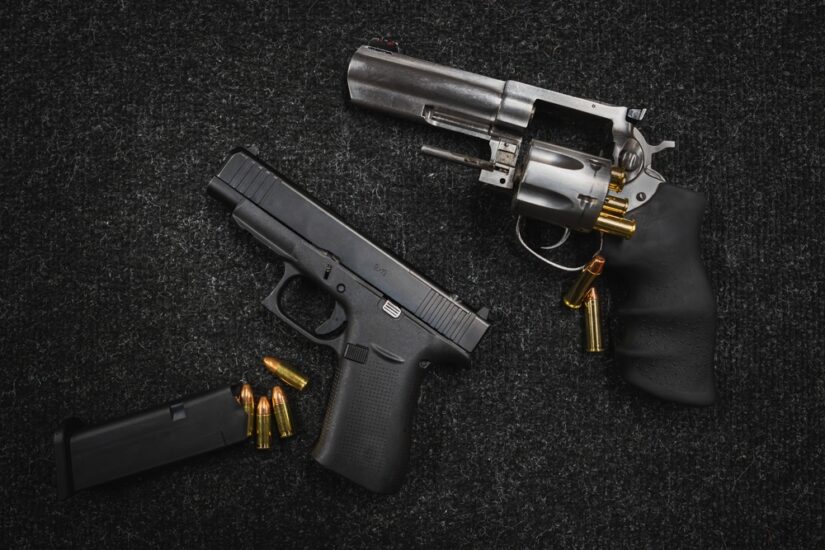
July 3, 2025
In Texas, stealing a firearm is a serious offense that carries harsh penalties. Regardless of the weapon’s worth, firearm theft is always considered a state jail felony, in contrast to other types of theft.
Convictions carry penalties of up to $10,000 in fines and 180 days to two years in prison. Charges may be upgraded to a third-degree felony with a sentence of two to ten years in prison if there are repeated violations or aggravating circumstances, such as previous felony convictions or the use of the handgun in another crime.
If you’re facing firearm theft charges, understanding Texas laws and building a strong defense is important. Read on for penalties, legal definitions, and defense strategies.
Texas Firearm Theft Laws Explained
How Texas Law Defines Firearm Theft
Texas views the theft of firearms as a distinct crime with particular legal considerations. Section 31.03(a) of the Texas Penal Code states that theft happens when someone takes anything illegally with the intention of depriving the owner of it.
The term “appropriation” refers to gaining control over property, which means you don’t have to physically grab a firearm to be charged with theft. Similarly, “unlawfully appropriates” covers situations where the property is taken without the owner’s consent or when someone knowingly possesses a firearm that was already stolen. Even if you didn’t steal the gun yourself, having it in your possession while knowing it’s stolen can lead to charges.
This intent is a important element. Accidentally taking someone’s firearm or borrowing it with their permission doesn’t meet the legal threshold for theft. However, knowingly holding onto a stolen firearm can result in the same legal consequences as stealing it in the first place.
Criminal Charges and Felony Classifications
Firearm theft in Texas is treated differently than other theft offenses. Unlike most theft cases, where charges depend on the value of the stolen item, firearm theft is automatically classified as a state jail felony, regardless of the gun’s worth. Whether it’s a $200 used handgun or a $3,000 custom rifle, firearm theft carries the same charge—a state jail felony. The penalties for such an offense include 180 days to 2 years in a state jail facility and a fine of up to $10,000.
In certain situations, enhanced penalties may come into play. For example, if the firearm is used as a deadly weapon during the theft, if the defendant has prior felony convictions, or if the stolen firearm is involved in another crime, the consequences can be more severe.
It’s also important to distinguish between firearm theft and unlawful possession of a firearm. While unlawful possession can range from a misdemeanor to a felony depending on the circumstances, firearm theft is always classified as a state jail felony.
Penalties for Firearm Theft in Texas
State Jail Felony Penalties
If convicted of firearm theft as a state jail felony, you could face 180 days to 2 years in state jail and fines reaching up to $10,000, regardless of the firearm’s value.
However, the consequences don’t stop there. A conviction leaves a permanent mark on your record, often accompanied by societal judgment. In addition to the severe legal fines and punishments that accompany being convicted of firearm theft, one must also take into account the social stigma that goes along with it.
Enhanced Penalties for Repeat Offenders
For those with prior convictions or other aggravating circumstances, Texas law enforces stricter punishments. If you have a prior felony conviction and are charged with firearm theft, the offense is elevated to a third-degree felony. This sentence comes with 2 to 10 years in prison and fines up to $10,000.
Similarly, if the stolen firearm is used as a deadly weapon during the theft, the charge is also upgraded to a third-degree felony with the same penalties. Additionally, if the stolen firearm is later used in another crime, you could face charges for both the theft and the subsequent offense, leading to even harsher sentences.
The issue of firearm theft is far-reaching. Nationwide, over 200,000 firearms are stolen annually, with more than 95% of these thefts involving guns stolen from private individuals, according to ATF reports.
Penalty Comparison Chart
Here’s a breakdown of penalties for firearm theft in Texas:
| Offense Level | Prison/Jail Time | Fine | Additional Consequences |
| State Jail Felony (Standard) | 180 days – 2 years | Up to $10,000 | Permanent loss of gun rights, criminal record |
| Third-Degree Felony (Enhanced) | 2 – 10 years | Up to $10,000 | Permanent loss of gun rights, criminal record |
The leap from a 2-year maximum sentence to a potential 10 years in prison highlights just how important it is to understand the details of your case if you’re facing firearm theft charges.

Defense Options for Firearm Theft Cases
Defense Strategies That Work
Facing firearm theft charges in Texas can be intimidating, but there are several strategies to challenge the prosecution’s case and protect your rights under the law.
The best defense will depend on the particulars of your case, but many tactics focus on making it harder for the prosecution to establish theft. Proving ownership is a key tactic. Providing receipts, registration documents, or witness testimony can help refute claims of theft. Similarly, demonstrating a lack of intent is just as critical. Under Texas law, the prosecution must show that you intended to take the firearm permanently from its rightful owner.
Mistaken identity is another potential defense, especially in cases where others had access to the firearm. Evidence like security footage, alibi witnesses, or conflicting testimony can support this argument.
The Fourth Amendment also plays a role. If evidence against you was obtained unlawfully, it can be challenged and potentially suppressed in court.
Disproving knowledge of the firearm’s theft is another angle. If you bought it from a legitimate seller or received it as a gift without knowing its origin, you could create reasonable doubt in the prosecution’s case.
Other defenses include duress (if you were coerced), entrapment (if law enforcement induced you to commit the crime), and mental incapacity (if a psychological condition prevented you from forming criminal intent).
Your Best Defense Starts with the Right Attorney
Given the complexity of firearm theft cases, having an experienced attorney can make all the difference. The stakes are high, and a skilled lawyer from The Napier Law Firm can help you navigate this challenging process.
The first step is to secure legal representation immediately and avoid speaking with law enforcement without your attorney present. Contact a Firearm Theft Legal Expert to ensure that your rights are protected and that proper procedures are followed throughout the investigation.
Don’t face firearm theft charges alone. Contact The Napier Law Firm today to protect your rights and secure the experienced legal representation you need.